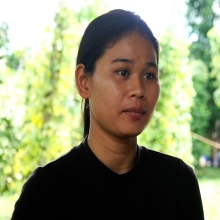Good health and nutrition are critical for mothers and their babies and cannot be achieved through the efforts of the health sector alone. In Cambodia the Ministry of Health and National Committee for Sub-National Democratic Development, along with provincial, district, and local governments, have been collaborating on an initiative to improve the quality of essential care for women and infants, while also encouraging more pregnant women to visit their local health centers so they can access these services. By focusing on the first 1,000 days of life—from pregnancy to a child’s second birthday—the country is looking to establish a solid foundation for its children’s growth, cognitive development, and future potential.
This is where Vorn Dory Saray comes in. She is one of a group of community health workers, locally known as “VHSGs” (Village Health Support Group), contracted by her commune and benefitting from new training and incentives to serve as a vital link between the village health centers and the local community. She plays a central role in an effort of local governments to invest in the health and wellbeing of their citizens.
“My job is to keep a list of pregnant women and 2-year-olds in each household. I can also advise on health care, for example on immunization or nutritious food,” says Ms Dory, who works in Putil village, Mondul Kiri province. “With pregnant women, I tell them when to go for prenatal checks and to be sure to take enough iron pills. If I see a child is thin or pale, I would tell the parents to take them to the health center.”

